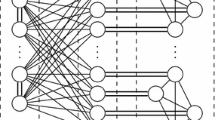Abstract
Greedy algorithms are simple, but their relative power is not well understood. The priority framework [5] captures a key notion of “greediness” in the sense that it processes (in some locally optimal manner) one data item at a time, depending on and only on the current knowledge of the input. This algorithmic model provides a tool to assess the computational power and limitations of greedy algorithms, especially in terms of their approximability. In this paper, we study priority algorithm approximation ratios for the Subset-Sum Problem, focusing on the power of revocable decisions. We first provide a tight bound of α ≈ 0.657 for irrevocable priority algorithms. We then show that the approximation ratio of fixed order revocable priority algorithms is between β ≈ 0.780 and γ ≈ 0.852, and the ratio of adaptive order revocable priority algorithms is between 0.8 and δ ≈ 0.893.
Preview
Unable to display preview. Download preview PDF.
Similar content being viewed by others
References
Angelopoulos, S., Borodin, A.: On the power of priority algorithms for facility location and set cover. Algorithmica 40, 271–291 (2004)
Arrow, K.: Social Choice and Individual Values. Wiley, Chichester (1951)
Baptiste, P.: Polynomial time algorithms for minimizing the weighted number of late jobs on a single machine with equal processing times. Journal of Scheduling 2, 245–252 (1999)
Bar-Noy, A., Guha, S., Naor, J., Schieber, B.: Approximating throughput in real-time scheduling. SIAM Journal of Computing 31, 331–352 (2001)
Borodin, A., Nielsen, M., Rackoff, C.: (Incremental) priority algorithms. Algorithmica 37, 295–326 (2003)
Borodin, A., Boyar, J., Larsen, K.: Priority algorithms for graph optimization problems. In: Persiano, G., Solis-Oba, R. (eds.) WAOA 2004. LNCS, vol. 3351, pp. 126–139. Springer, Heidelberg (2005)
Chrobak, M., Durr, C., Jawor, W., Kowalik, L., Kurowski, M.: On scheduling equal length jobs to maximize throughput. To appear in Journal of Scheduling.
Chuzhoy, J., Ostrovsky, R., Rabani, Y.: Approximation algorithms for the job interval scheduling problem and related scheduling problems. In: Proceedings of 42nd Annual IEEE Symposium of Foundations of Computer Science, pp. 348–356. IEEE Computer Society Press, Los Alamitos (2001)
Davis, S., Impagliazzo, R.: Models of greedy algorithms for graph problems. In: Proceedings of the 15th Annual ACM-SIAM Symposium on Discrete Algorithms, pp. 381–390. ACM Press, New York (2004)
Erlebach, T., Spieksma, F.: Interval selection: Applications, algorithms, and lower bounds. Journal of Algorithms 46, 27–53 (2003)
Garey, M., Johnson, D.: Computers and Intractability: A Guide to the Theory of NP-completeness. Freeman, San Francisco (1979)
Horn, S.: One-pass algorithms with revocable acceptances for job interval selection. Master’s thesis, University of Toronto (2004)
Ibarra, O., Kim, C.: Fast approximation algorithms for the knapsack and sum of subset problem. Journal of the ACM 22, 463–468 (1975)
Iwama, K., Taketomi, S.: Removable online knapsack problems. In: Widmayer, P., Triguero, F., Morales, R., Hennessy, M., Eidenbenz, S., Conejo, R. (eds.) ICALP 2002. LNCS, vol. 2380, pp. 293–305. Springer, Heidelberg (2002)
Kellerer, H., Mansini, R., Pferschy, U., Speranza, M.: An efficient fully polynomial approximation scheme for the subset-sum problem. Journal of Computer and System Science 66, 349–370 (2003)
Martello, S., Toth, P.: Knapsack Problems: Algorithms and Computer Implementations. John Wiley and Sons, Chichester (1990)
Moore, J.: An n-job, one machine sequencing algorithm algorithm for minimizing the number of late jobs. Management Science 15, 102–109 (1968)
Regev, O.: Priority algorithms for makespan minimization in the subset model. Information Processing Letters 84, 153–157 (2002)
Ye, Y., Borodin, A.: Priority algorithms for the subset-sum problem. Technical Report, University of Toronto (2007), http://www.cs.toronto.edu/~bor
Author information
Authors and Affiliations
Editor information
Rights and permissions
Copyright information
© 2007 Springer-Verlag Berlin Heidelberg
About this paper
Cite this paper
Ye, Y., Borodin, A. (2007). Priority Algorithms for the Subset-Sum Problem. In: Lin, G. (eds) Computing and Combinatorics. COCOON 2007. Lecture Notes in Computer Science, vol 4598. Springer, Berlin, Heidelberg. https://doi.org/10.1007/978-3-540-73545-8_49
Download citation
DOI: https://doi.org/10.1007/978-3-540-73545-8_49
Publisher Name: Springer, Berlin, Heidelberg
Print ISBN: 978-3-540-73544-1
Online ISBN: 978-3-540-73545-8
eBook Packages: Computer ScienceComputer Science (R0)




